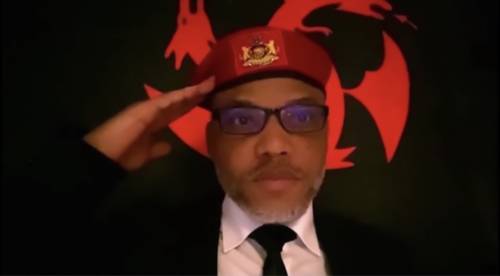News
SERAP Approaches Court, Demands Slash in Allowances of Buhari, Governors

In the suit marked FHC/ABJ/CS/658/2021 filed on Friday, SERAP argued that “slashing jumbo pay for these high-ranking political office-holders would reduce the unfair pay disparity between political officer holders and judicial officers, address the persistent poor treatment of judges, and improve access of victims of corruption to justice and effective remedies.”
“While high-ranking political officeholders continue to enjoy lavish allowances, including life pensions, and access to security votes, which they have powers to spend as they wish, the remuneration and allowances of judges are grossly insufficient to enable them to maintain themselves and their families in reasonable comfort,” the organization said.
“The huge pay disparity between these high-ranking political officer-holders and judges is unfair, unjust and discriminatory, especially given the roles of judges to the people and the country.
“While government reviewed upward the salaries and allowances of political office holders on four occasions between May 1999 and March 2011, the salaries and allowances of judicial officers were only reviewed twice during the same period.
“The increase in the cost of living and the injustice of inadequate salaries bears heavily on judges, as it undermines their ability to effectively perform their judicial functions.
“Nigerians would continue to bear the brunt of denied access to justice, a better judiciary and a better administration of justice until judges across the country are paid what they rightly deserve.”
SERAP is asking the court for “an order of mandamus to direct and compel the RMAFC to send its downward review of the remuneration and allowances of these high-ranking public office holders and recommendations to the national assembly for appropriate remedial and legislative action, as provided for by the Nigerian Constitution 1999 (as amended).”
“An order of mandamus to direct and compel the RMAFC to perform its mandatory constitutional duty to urgently review upward the remuneration, salaries and allowances, as well as the conditions of service for Nigerian judges.”
SERAP is also seeking “an order of mandamus to direct and compel NSIWC to perform its mandatory legal duty to urgently examine, streamline and recommend upward remuneration and allowances of Nigerian judges, and to recommend downward review of allowances of President Buhari, Vice-President Osinbajo, 36 governors and lawmakers to the national assembly.”
Kolawole Oluwadare and Adelanke Aremo are the lawyers handling the matter
Joined in the suit as respondents are Ahmad Lawan, senate president; Femi Gbajabiamila, speaker of house of representatives (for themselves and on behalf of all members of the national assembly) and the National Judicial Council (NJC).
In June, SERAP had also secured a court order directing RMAFC to review the salaries and allowances of members of the national assembly, to reflect the country’s current economic realities.
News
After Kebbi School Attack, Gunmen Invade Catholic School in Niger, Abduct Many Students

News
Omotosho Orders Removal of Nnamdi Kanu from Courtroom, Says IPOB Leader Was ‘Unruly’

Justice James Omotosho of the Federal High Court in Abuja on Thursday began delivering judgment in the long-running terrorism trial of Indigenous People of Biafra leader Nnamdi Kanu in the defendant’s absence.
The judge ordered that the proceedings continue without Kanu after describing his behaviour in court as unruly.
The decision followed the dismissal of three fresh motions filed by the IPOB leader, which the court deemed unmeritorious.
Kanu had interjected during the ruling, insisting that the court could not proceed as he had not filed his final written address.
He accused Justice Omotosho of bias and claimed that the judge lacked understanding of the law.
After a brief recess, the prosecution, led by Adegboyega Awomolo, urged the court to continue the trial without Kanu, citing his disruptive conduct.
Justice Omotosho stated that while a defendant has a constitutional right to be present during trial, repeated misconduct can allow proceedings to continue in their absence.
“If a defendant misconducts himself or acts in an unruly manner during the course of his trial, his trial can be conducted in his absence,” he said.
He added that the Court of Justice is a temple of God.
He noted that Kanu’s unruly attitude was not new, as he had previously exhibited similar behaviour several times in the past.
The judge added that Kanu had indicated he would not present a defence, and that Thursday’s session was for judgment and possible sentencing.
Following the order, Kanu was removed from the courtroom, and the judge proceeded with delivering the ruling.
News
Season of Delight: Glo Assures Subscribers of Abundance, Dream Home with ‘Jollof Promo’

Globacom has once again set the national stage aglow with the unveiling of “Jollof Promo”, a recharge-and-reward campaign brimming with colour, excitement, and the irresistible lure of extraordinary prizes. In true Glo fashion, it is a celebration engineered with flair—an exuberant blend of entertainment, reward, and customer appreciation designed to ignite joy across the country.
Announcing the initiative in Lagos, the digital solutions giant declared that every recharge now counts for far more than connectivity. With each top-up, subscribers accumulate Jollof Points, the golden gateway into a world of winnings—from instant airtime and generous data bonuses to hefty cash prizes running into millions. Yet the crown jewel of this spectacular season is undeniably the fully completed bungalow in Ikeja GRA, one of Lagos’s most coveted and serene residential districts, waiting to transform one fortunate customer’s life forever.
“The Jollof Promo is our heartfelt way of celebrating and rewarding our customers,” the company affirmed. “With thousands of prizes worth hundreds of millions of Naira, this initiative deepens our commitment to giving back to subscribers across Nigeria, following the overwhelming success of our previous reward schemes.”
The journey begins with the Freemium Offer, an open invitation to abundance. With a simple recharge of ₦100 or more, customers enjoy complimentary airtime—a warm welcome into the Jollof experience. By dialling *278#, subscribers instantly activate the benefit and set themselves on the path to even greater rewards.
Participation, however, does not end with the Freemium tier. All subscribers are ushered into the Jollof Premium Club, where the stakes rise spectacularly. Here, daily draws offer a life-changing ₦10 million to a lucky winner, alongside ₦1 million each for three others and ₦100,000 each for an additional ten. It is a cascade of fortune designed to spread delight across thousands of households.
For those drawn to the thrill of daily gaming, Jollof Points unlock access to a suite of engaging games. The Jollof Freemium game stages hourly excitement from 8 a.m. to 7 p.m., with ₦1,000 up for grabs every hour—except at high noon, when the reward swells to an impressive ₦10,000. As the tiers ascend, the prizes grow richer: weekly trivia challenges offer ₦50,000, while monthly contests promise ₦1 million to sharpen minds and reward loyal participation.
With the simplicity of dialling *278#, subscribers old and new can step into this spirited carnival of rewards. Globacom urges Nigerians everywhere to embrace the Jollof Promo and savour not only the abundance it offers but also the host of innovative, customer-focused services that continue to define the Glo experience.
In a season shaped by generosity, imagination, and celebration, the Jollof Promo stands out as a masterstroke—a reminder of Globacom’s enduring promise to enrich lives, elevate experiences, and deliver telecommunications excellence with a distinctly Nigerian flair.






